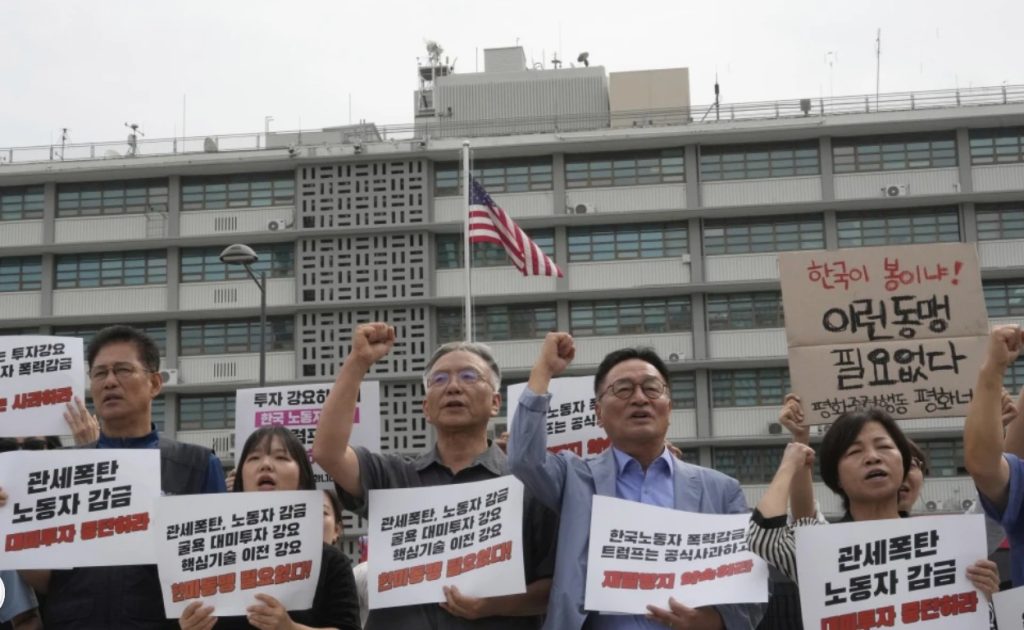
President Donald Trump’s push to revitalize American manufacturing by luring foreign investment into the U.S. has run smack into one of his other priorities: cracking down on illegal immigration.
Hardly a week after immigration authorities raided a sprawling Hyundai battery plant in Georgia, detained more than 300 South Korean workers and showed video of some of them shackled in chains, South Korean President Lee Jae Myung warned that the country’s other companies may be reluctant to take up Trump’s invitation to pour money into the United States.
The detained South Koreans were released Thursday and most were flown home.
If the U.S. can’t promptly issue visas to the technicians and other skilled workers needed to launch plants, then “establishing a local factory in the United States will either come with severe disadvantages or become very difficult for our companies,” Lee said Thursday. “They will wonder whether they should even do it.”
The raid and subsequent diplomatic crisis show how the Trump administration’s mass deportation goals are running up against its efforts to bring in money from abroad to drive the U.S. economy and create more jobs. Moves like workplace immigration enforcement and visa restrictions could risk alienating allies that are pledging to invest hundreds of billions of dollars in the U.S. to avoid high tariffs.
South Korea is already a big investor in the US
Trump’s economic agenda is built around using hefty tariffs on imports, including a 15% levy on South Korean products, as a cudgel to force manufacturing to return to the U.S. He’s repeatedly said foreign companies can escape his tariffs if they produce in America. South Korea, already a top investor, pledged to invest $350 billion in the U.S. when the two sides announced a trade deal in July.
It made more investments in new construction, such as factories, on previously undeveloped land than any other country in 2022. Last year, it ranked 12th in the world with $93 billion in total American investment — including acquisitions of existing companies, according to the U.S. Bureau of Economic Analysis.
But the dramatic roundup of South Koreans and others working to set up the battery plant threatens to put a chill on the investment push. Indeed, Trump seems to be trying to undo the damage.
While demanding that foreign investors “LEGALLY bring your very smart people,” Trump also promised to “make it quickly and legally possible for you to do so.”
“President Trump will continue delivering on his promise to make the United States the best place in the world to do business, while also enforcing federal immigration laws,” White House spokeswoman Abigail Jackson said in a statement Thursday.
For now, the South Koreans are furious and immigration experts are puzzled. It’s been common practice for decades for foreign companies — such as the Japanese and German carmakers that have built factories in the American Midwest and South — to send technical specialists from their home countries to help open plants in the United States. Most of them train U.S. workers, then go home.
“Japanese managers, senior engineers, other technical experts had to come to the United States to set this stuff up,” said Lee Branstetter, a professor of economics and public policy at Carnegie Mellon University who’s studied Japanese auto plants in the U.S.
American companies do the same thing, sending U.S. workers overseas temporarily to get operations started.
Some experts call it a baffling, ‘performative’ raid
U.S. Immigration and Customs Enforcement launched the roundup last week at a manufacturing site that state officials have touted as Georgia’s largest economic development project.
“It’s really baffling to me why this raid would have occurred,” said Ben Armstrong, executive director of the Massachusetts Institute of Technology’s Industrial Performance Center. “The existence of these workers shouldn’t have been a surprise.”
U.S. immigration officials could have audited the workers’ documents without the drama, retired immigration lawyer Dan Kowalski said, adding that “raiding and arresting and putting them in chains and shackles is 100% performative.”
It had to do with “wanting to look tough — arresting as many foreigners as possible for the photo-op,” said Kowalski, who is now a writer and editor.
U.S. work visa categories make it a challenge to bring in foreign workers quickly and easily, said Kevin Miner, an immigration lawyer in Atlanta.
Some run on a highly competitive lottery system, are for seasonal workers and have a cap, or are restricted to managers and executives. Other short-term visas have strict limits on employment.
After meeting with Secretary of State Marco Rubio this week in Washington, South Korean Foreign Minister Cho Hyun said they agreed to set up a joint working group for discussions on creating a new visa category to make it easier for South Korean companies to send their staff to work in the United States.
Deputy Secretary of State Christopher Landau also plans to visit Seoul this weekend.
Calls for fixes to the US visa system
Hyundai’s “desire to get this thing up and running as quickly as possible ran head-on into the often time-consuming processes that the U.S. government requires in order to issue business visas,” said Branstetter of Carnegie Mellon.
U.S. authorities say those detained were “unlawfully working” at the plant. Charles Kuck, a lawyer representing several of the South Koreans who were detained, said the “vast majority” of the workers from South Korea were doing work authorized under a visa program.
Julia Gelatt, associate director of the U.S. immigration policy program at the Migration Policy Institute, said work visas — like nearly all other aspects of the U.S. immigration system — need reform.
“Our visa system does not envision this kind of scenario,” Gelatt said, of bringing in skilled foreign workers needed for the initial setup of factories. The U.S. has a few country-specific visa categories that make it easier to bring in certain foreign workers, like those from Mexico, Australia or Singapore.
“The goal,” said MIT’s Armstrong, “should be to make foreign direct investment as streamlined as possible.”